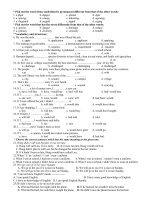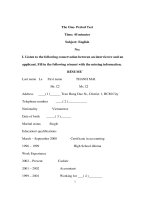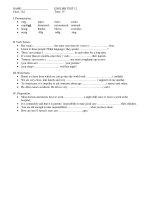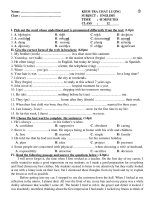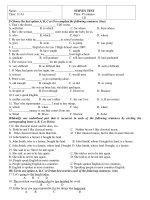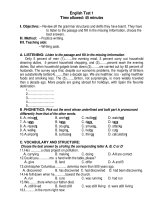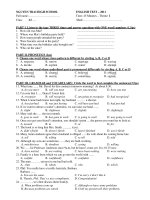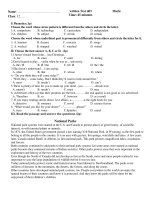ENGLISH TEST – 2011 Time: 45 Minutes potx
Bạn đang xem bản rút gọn của tài liệu. Xem và tải ngay bản đầy đủ của tài liệu tại đây (68.69 KB, 5 trang )
NGUYEN TRAI HIGH SCHOOL ENGLISH TEST – 2011
Full name:…………………………… Time: 45 Minutes – Theme: 1
Class :12… Mark: ………………………………….
PART I. Listen to the tape THREE times and answer questions with ONE word/ numbers (1.5ps)
1. How old was Mai?
2. Where was Mai’s birthday party held?
3. How many people attended the party?
4. Were biscuits served at the party?
5. What time was the birthday cake brought out?
6. Who cut the cake?
PART II. PHONETICS (1ps)
A. Choose one word whose stress pattern is different by circling A, B, C or D
7. A. response
8. A. decide
B. sorrow
B. explain
C. marriage
C. waiter
D. waving
D. attempt
B. Choose one word whose underlined part is pronounced differently by circling A, B, C or D
9. A. attracted
10. A. considers
B. cleaned
B. secrets
C. believed
C. sometimes
D. obliged
D. signals
PART III. GRAMMAR and VOCABULARY: Circle the word to best complete the sentences(3.5ps)
11. What time Mr. David for this contract tomorrow morning? At about 8.30.
A. do you meet B. will you meet C. are you meeting D. have you met
12. I’m sure that I Dean if I meet him.
A. recognize B. will recognize C. am going to recognize D. had recognized
13. When I came back home last night, my husband ……… a shower.
A. has just had B. was just having C. will have just had D. had just had
14. If we want to attract a waiter’s attention, we can raise our hand
A. slight B. slightness C. slightly D. slightingly
15. Mary said she the next month.
A. goes to work B. has gone to work C. is going to work
D. was going to work
16. Once you get your friend’s attention, you shouldn’t point the person you want her to look at.
A. toward B. in C. at D. for
17. The book is so long that Mrs. Smith it yet.
A. didn’t finish B. doesn’t finish C. hasn’t finished D. won’t finish
18. Many Asian students agree that a husband is obliged his wife about his coming home late.
A. tell B. telling C. to tell D. told
19. Although my sons are sometimes , they are hard-working.
A. mischievous B. obedient C. caring D. willing
20. We for Professor Anderson since 9a.m, but he hasn’t come yet. It is 10.15 now.
A. have waited
B. are waiting C. have been waiting D. were waiting
21. Family is a base from which we can go into the world with
A. confide B. confidently C. confident
D. confidence
22. The man ……… sat next to me had bad cold.
A. , that B. whom C. who D. which
23. Phil: You really have a terrific hairstyle, Barbara.
Barbara:
A. You are the same.
B. Thanks, Phil. That’s a nice compliment.
C. I’m sorry. I don’t like it.
D. Congratulation!
24. …………, we often discuss them frankly.
A. When problems come up
B. Because problems are solved
C. Although we have some problems
D. Until my parents tell their problems
PART IV. READING:
A. Read the following passage and then answer the following questions (2ps)
In the United States and Canada, it is very important to look at a person directly in the eyes when you
are having a conversation with him or her. If you look down or to the side when the person is talking,
that person will think that you are not interested in what he or she is saying. This, of course, is not
polite. If you look down or to the side when you are talking, you may appear to be hiding something;
that is, it might seem that you are not honest.
However, people who are speaking will sometimes look away for a few seconds when they are
thinking or trying to find the right word. But they always turn immediately back to look at the listener
directly in the eyes. These social ‘rules’ are the same for two men, two women, a man and a woman,
or an adult and a child.
25. How do you look at a person when you are having a conversation with him or her in the United States?
26. Why is it not polite if you look down or to the side when a person is talking?
27. In which situations can people who are speaking look away for a few seconds?
28. Do two women have to obey these social rules when they are talking?
B. Choose the BEST answers to complete the passage (12ps)
Some societies, such as America and Australia, for example, are mobile and very open. People here
(29) jobs and move house quite frequently. As a result, they have a lot of (30) that last only
a short time, and they need to get to know people quickly. So it’s normal to have friendly
conversations (31) people that they have just met, and you can talk about things that (32)………
cultures would regard as private. (mobile: cơ động)
29. A. change
30. A. relations
31. A. to
32. A. other
B. apply for
B. friends
B. with
B. every
C. get
C. friendship
C. and
C. any
D. do
D. relationships
D. about
D. one
PART VI. WRITING
A. Correct ONE mistake
33. During the school year, I am not allow to watch TV until I have finished my homework.
A B C D
34. We got lost in the forest because we had a map with us.
A B C D
35. We would attract her attention if we have a chance, but we don’t.
A B C D
36. A large number of Indian men agree that it is unwise to confide to their wives.
A B C D
B. Change these sentences into reported speech (1p)
37. ‘Breakfast is served between 7 and 9’.
The waiter said that
38. ‘Children will like my new film’.
The director thought that
39. ‘I haven’t bought any tickets’.
My father said
40. ‘John didn’t come to our party last Sunday’.
His wife said
NGUYEN TRAI HIGH SCHOOL ENGLISH TEST – 2009
Full name:…………………………… Time: 45 Minutes – Theme: 2
Class :12… Mark: ………………………………….
PART I. Listen to the tape THREE times and answer questions with ONE word/ numbers (1.5ps)
1. What time did the birthday party begin?
2. Did Mai like having the birthday party at a restaurant?
3. Who brought out the birthday cake?
4. How many candles were there on the cake?
5. What did the guests do while the cake was being cut?
6. What time did the party end?
PART II. PHONETICS (1ps)
A. Choose one word whose stress pattern is different by circling A, B, C or D
7. A. caring
8. A. accept
B. active
B. market
C. signal
C. approach
D. attract
D. polite
B. Choose one word whose underlined part is pronounced differently by circling A, B, C or D
9. A. attempted
10. A. situations
B. needed
B. dates
C. washed
C. enjoys
D. supported
D. feelings
PART III. GRAMMAR and VOCABULARY: Circle the word to best complete the sentences(3.5ps)
11. I ‘ The Lovely Mother’ tonight. Would you like to go with me?
A. am seeing B. will see C. saw D. have seen
12. My mother is sure that we all the things we want to do by this December.
A. finish B. would have finished C. will have finished D. have finished
13. The amount of money ……… had been taken by the robbers was found by the police.
A. which B. , that C. who D. whose
14. When teacher wants to attract someone’s attention in class, pointing is
A. accepted B. acceptable C. acceptance D. accept
15. David thought Mary to the factory the next month.
A. returns B. would return C. returned
D. is returning
16. A survey has just been conducted to determine young people’s attitudes love and marriage.
A. toward B. in C. about D. for
17. It’s nice to see you again. We each other for a long time.
A. don’t see B. didn’t see C. won’t see D. haven’t seen
18. My dad is always willing a hand with cleaning the house.
A. give B. giving C. to give D. given
19. Although my mother is very busy, she is very
A. mischievous B. hurried C. caring D. willing
20. Hey, Tom. Your wife for you all the morning. Where have you been?
A. has been looking
B. is looking C. has looked D. was looking
21. A wife should maintain her beautiful after marriage.
A. appear B. appearance C. apparent D. disappearance
22. By the time I got to the office, the meeting …… without me.
A. had already begun
B. has already begun
C. would already begun
D. already begun
23. Phil: How beautiful your house is, Barbara!
Barbara:
A. No, it’s ugly.
B. You are welcome!
C. I’m sorry. I don’t like it.
D. Thanks, Phil. That’s a nice compliment.
24. The American wife does not demand a record of her husband’s activities
A. because she trusts him to do the right things
B. wherever he does the right things
C. until the right things are done everyday
D. despite the fact that she does not care for him
PART IV. READING:
A. Read the following passage and then answer the following questions (2ps)
In the United States and Canada, it is very important to look at a person directly in the eyes when you
are having a conversation with him or her. If you look down or to the side when the person is talking,
that person will think that you are not interested in what he or she is saying. This, of course, is not
polite. If you look down or to the side when you are talking, you may appear to be hiding something;
that is, it might seem that you are not honest.
However, people who are speaking will sometimes look away for a few seconds when they are
thinking or trying to find the right word. But they always turn immediately back to look at the listener
directly in the eyes. These social ‘rules’ are the same for two men, two women, a man and a woman,
or an adult and a child.
25. How do you look at a person when you are having a conversation with him or her in Canada?
26. What do people think if you look down or to the side when you are talking?
27. Is it acceptable that people who are speaking look away in certain situations?
28. Who has to follow these social rules when they are talking?
B. Choose the BEST answers to complete the passage (12ps)
Some societies have ‘universalist’ cultures. These societies have a strong (29) for rules, and they
treat (30) person and situation in basically the same way. ‘Particularist’ societies, on the other
hand, also have rules, but they are less (31) than in the society’s unwritten ideas about what is right
or wrong for a particular situation or a particular person. So the formal rules are bent (32) the
needs of the situation or the importance of the person. (bend/ bent: bắt phải tuân theo)
29. A. wish
30. A. some
31. A. interesting
32. A. to fit
B. respect
B. any
B. severe
B. to follow
C. love
C. every
C. hard
C. to do
D. ambition
D. about
D. important
D. to require
PART VI. WRITING
A. Correct ONE mistake
33. During the summer, my father wasn’t permit me to play basketball until I had finished all my work
A B C D
34. Although he had a bad cold, William still stayed ill bed all day.
A B C D
35. If I were you, I will try to attract her attention by waving to her.
A B C D
36. Waving is considering impolite in some Asian countries.
A B C D
B. Change these sentences into reported speech (1p)
37. ‘We will go home immediately’.
The boy said that
38. ‘I’m not going out with Jenny’.
Peter thought that
39. ‘Tom came back from the U.S last Sunday’.
My father said
40. ‘Nobody has sent the message to us’.
They said that
Make up sentences with given cues (1p)
33. John/ enjoy/ listen/ music/ before/ bedtime.
34. His eel soup/ best soup/ I/ ever/ eat.
35. I/ move/ into/ Apartment 2C/ lately.
36. Thank/ people/ be/ important part/ every culture.
Make up sentences with given cues (1p)
1. My brother/ enjoy/ play/ football/ after/ school.
2. This/ best/ picture/ / I/ ever/ paint.
3. We/ not/ write/ each other/ recently.
4. Express/ gratitude/ be/ important part/ everyone.
